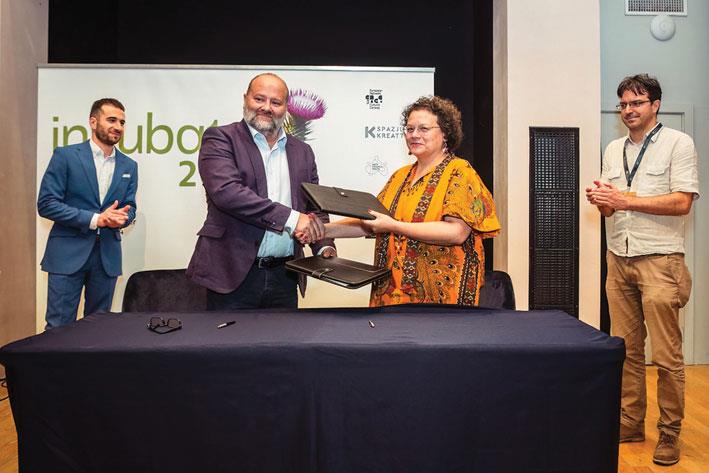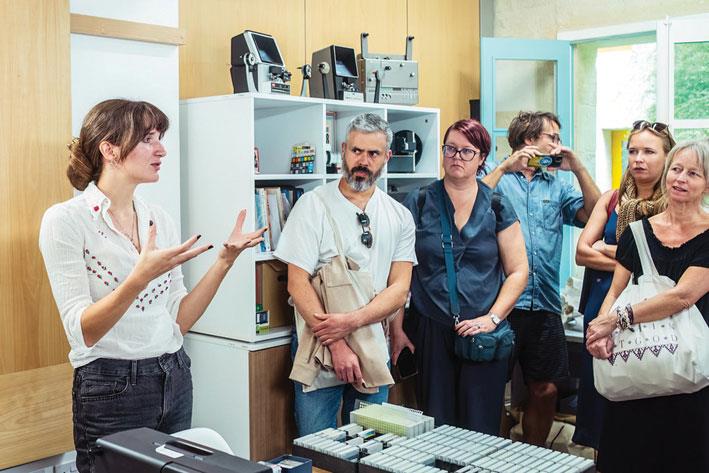Spazju Kreattiv, Malta's National Centre for Creativity, has recently hosted Incubator 2024, a transformative training programme designed to empower cultural professionals across Europe. Organised by the European Network of Cultural Centres (ENCC), in partnership with Spazju Kreattiv and supported by Arts Council Malta, Fondazione Compagnia di San Paolo and the European Union, this year's event offered mid- to senior-level professionals an immersive experience in European cultural cooperation. Focused on fostering innovation, collaboration and building a transnational learning community, Incubator+ provided participants with the opportunity to expand their impact within Europe's cultural sector.

Incubator is a capacity-building initiative by the ENCC, which has grown to include over 6,000 cultural organisations across 35 countries since its founding in 1994. The programme is aligned with the ENCC's mission of cooperation, learning and advocacy, encouraging cultural centres to engage in cross-border collaborations and apply for EU funding programmes like Creative Europe and Erasmus+. At its core, Incubator functioned as a laboratory for innovation, bringing together a community of learners and creators in the cultural field. Participants shared their experiences, learned from peers and built networks that transcended national borders, exactly the kind of environment that Incubator+ aimed to create.

Spazju Kreattiv was the main partner for this edition of Incubator - a dynamic cultural space located in Valletta's historic St James Cavalier. Hosting over 500 events annually, Spazju Kreattiv is more than just a venue for exhibitions and performances; it's an ecosystem that nurtures artistic innovation. The Centre was perfectly aligned with Incubator's goals, embodying creativity and international collaboration. The choice of Spazju Kreattiv highlighted Malta's growing importance within the European cultural scene. With its emphasis on artistic excellence and internationalisation, the centre provided the ideal setting for cultural professionals to engage in forward-thinking discussions, share ideas and explore new possibilities.

Incubator 2024 brought together a wide array of participants from across Europe, all of whom were actively involved in cultural projects spanning different sectors. These professionals, selected for their involvement in EU-funded initiatives or their potential to initiate cross-border collaborations, worked on diverse, inspiring projects. Participants included Latvia's Valmiera Culture Centre, which recently launched the country's first multimedia festival; Austria's Voices of Diversity, a project aimed at challenging stereotypes around Roma culture; Italy's L'Aquila Reale, which promotes cultural development in rural areas and Turkey's Sanatatak, a platform for arts, culture and activism. Through Incubator+, these cultural leaders refined their project management skills, explored new collaboration opportunities and navigated the complexities of European cultural funding systems.

The strength of Incubator+ was found in both its diverse participants and in the expertise of the trainers leading the sessions. This year's trainers included prominent cultural professionals from across Europe. Among them was Toni Attard, the founder of Culture Venture, who played a pivotal role in shaping Malta's cultural strategy and policy. Another key figure was Mauro Carta, an international project manager with over 20 years of experience in non-formal education and volunteer management.

Participants also learned from Giles Agis, executive director of the Brouhaha International Street Festival in the UK and Vittorio Bianco, co-coordinator of Cecchi Point, a multicultural hub in Turin. These experts guided participants through workshops on project writing, funding applications and the logistical aspects of managing international cultural projects, ensuring they left with concrete skills and strategies for their work.
The week-long programme offered a nice blend of intensive training sessions, hands-on workshops and cultural tours. Mornings were dedicated to skill-building, where participants engaged in focused sessions on everything from cultural funding to project management. In the afternoons, participants had the chance to explore Valletta, taking in the city's cultural heritage and history. Valletta's streets, architecture and arts scene highlighted the role of culture in shaping communities. Cultural tours included visits to the Valletta Design Cluster, a hub for design and entrepreneurship and Il-Kamra ta' Fuq in Mqabba, a community project championing local and international artists.
As Incubator 2024 concluded, it became clear that the programme played a crucial role in shaping the future of European cultural cooperation. By bringing together a diverse range of professionals and providing them with the tools they need to succeed in a European context, the programme contributed to broader goals of cultural sustainability, innovation and inclusivity. The event served as an example of the impact that collaboration can have on the cultural sector. Through programmes like Incubator+, Europe's cultural professionals were not just responding to change - they were actively shaping the future of the continent's cultural landscape.
As the participants immersed themselves in the week's activities, Valletta was filled with creativity, collaboration and forward-thinking ideas. Incubator 2024 was a reminder of the impeccable power of cultural exchange and cooperation, as new partnerships and projects came to fruition within its framework.